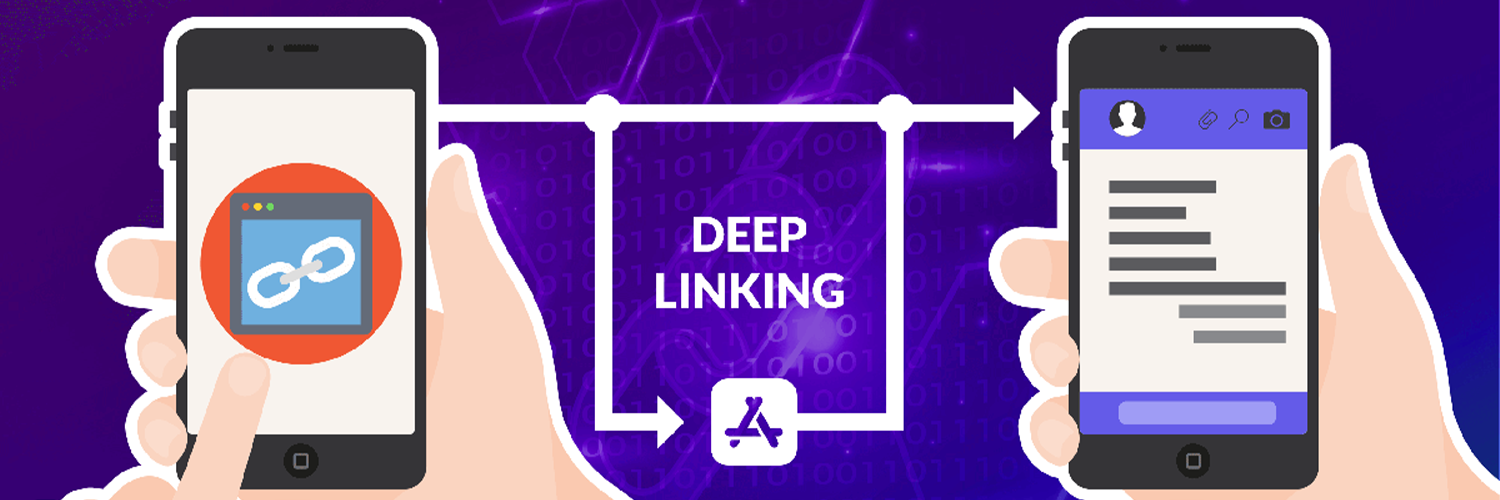How many hours do you think you spend daily on your phone? A lot. Studies show it’s around for an average 5 hours. That’s quite a lot, we learn, work, communicate, eat and commute using mobile apps. So the user experience of apps must be as smooth and simple as possible. While there are many strategies & techniques to improve the user experience, there’s a critical one that will help you increase your app user engagement and user acquisition fast. It’s deep linking.
What is deep linking?
Deep links are a technology that transfers user flow from outside the app to a specific page of your app through URI use, i.e., myapp://product/productId.
This can drastically enhance the user experience because the user will directly open the product page instead of opening the home page and searching for the product.
There are three types of deep linking—Standard, Deferred & contextual. The last two are developed versions of standard deep linking to improve mobile developers’ user experience and functionality. Let’s dig deep into them.
Three Types of deep links
Standard deep links
Standard deep linking was the first type developed. Its original goal was to direct users to a certain page in the app, The problem with this type was that it only worked if the user had the app installed, but he would be given an error if he doesn’t.
Deferred deep links
To fix the standard deep links issue, deferred links came to life.
In simple words, a Deferred deep link routes your users directly to a specific location in your app. but If he doesn’t have it installed, the user will be directed to the app store (google store or apple store), depending on his device. After he installs it and opens it, the app will open the specified location,
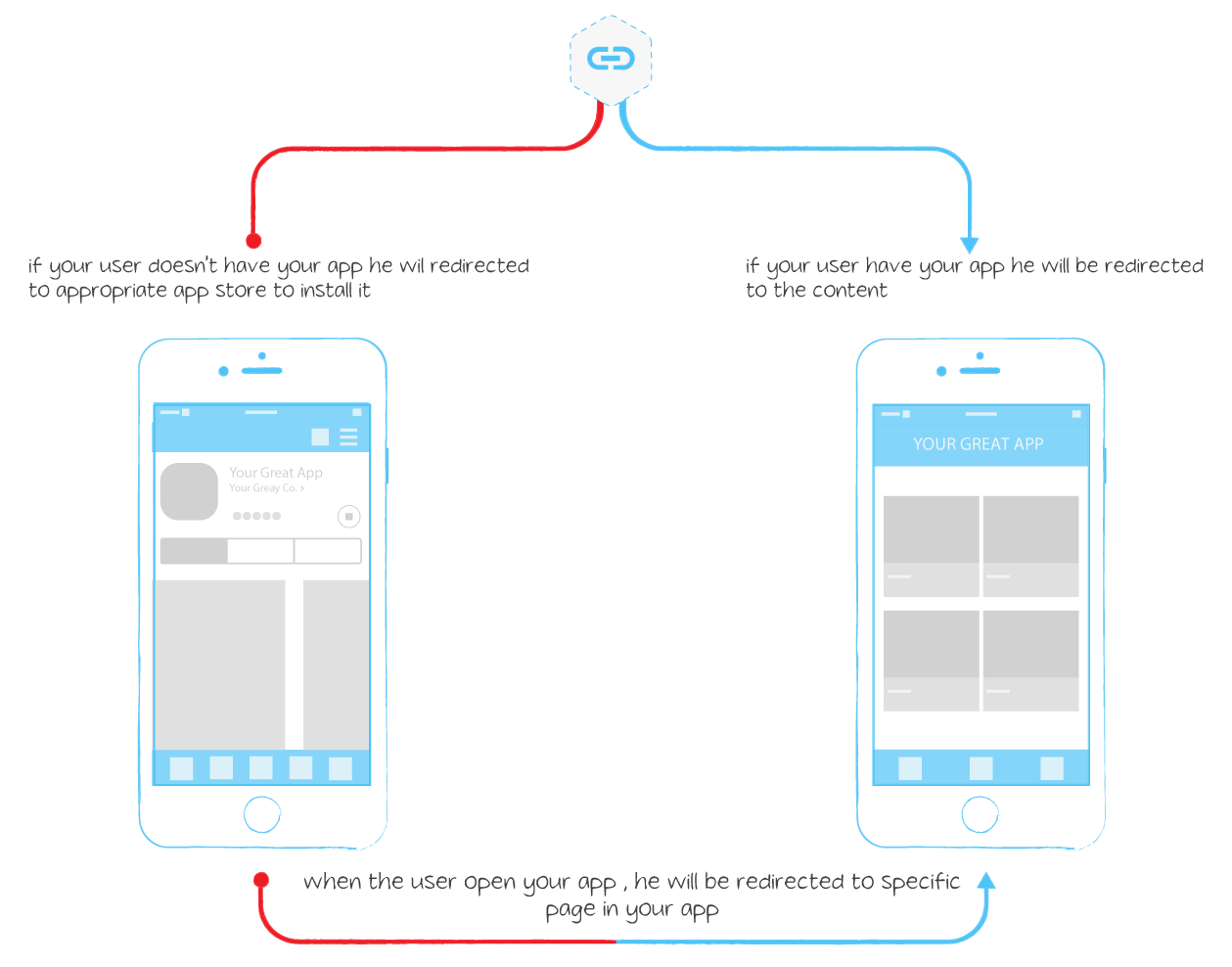
Contextual deep links
Although standard & deferred deep linking decreased friction, increased installs & improved user experience, its growth was a bit slow at first. This is because marketers & developers didn’t see much value in it.
Contextual deep linking changes the destination or content depending on user context like platform (iOS, Android), user location, etc. Additionally, it records & stores the user data.
Using contextual deep linking, developers and marketers can personalize the user experience to be suitable for each user depending on his device, data, or/and where he came from. This can improve the marketer’s analytics capacity to measure the performance of each channel and campaign.
Appgain smart deep links
Appgain offers a sophisticated smart deep linking product that has the features of deferred and contextualized deep linking. The product helps you in App install and user engagement campaigns to drive user acquisition as it is compatible with all devices & platforms. Additionally, it is compatible with all the marketing channels you might use like social media, display ads, email campaigns & SMS campaigns.
Finally, it helps in app install attribution to measure each campaign’s efficiency & ROI. It tracks & measures different attributes, including the user location, device system, the source he came from, plus his behavior inside the app.
This might look pretty nice, but we still haven’t emphasized how important mobile deep linking is. So let’s go through some of the most critical benefits of deep linking.
Why are deep links useful?
Enhance The User Experience
With deep links, users can more easily access the content. They will be seamlessly directed from the FB Ad or display ad to the discount page in your app instead of the home page.
Improve user acquisition
With deferred deep linking, the user will be smoothly directed to the app store, this will increase the number of app installs, but it doesn’t stop here. As the app will directly open the content, not the home page, users are more likely to engage immediately with the product, increasing the activation rate. By how much?
TechCrunch made a study showing that the activation rate coming from standard URLs downloads is 16%, while the activation rate coming from deep links is 29%.
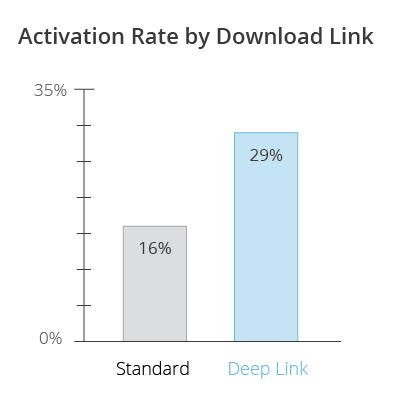
Personalize user Onboarding
You can also increase the activation rate, by personalizing the onboarding experience. Through contextual deep links, you can personalize the pages new users will be directed to, depending on where they came from.
For example, if a user came through a referral program, you can show the program details so he can get more discounts. If a user came through an influencer campaign, you could show the influencer picture with your product.
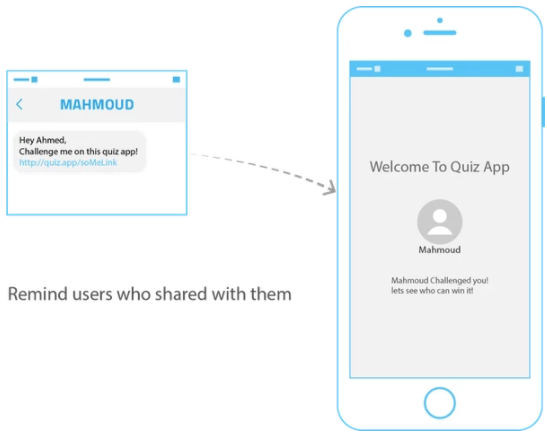
Improve User Engagement & Retention rate
It’s a universal fact that the numbers of active users drastically decrease over time. Nothing can stop that from happening, but what you can do is try to increase your engagement retention. Deep linking is a powerful tactic to do so. As deep linking doubles activation rate, it also doubles the retention rate. By sending app notifications with deep links or by Ads retargeting with deep links, users will be more engaged and active on your app.
Here is a graph from TechCrunch research, showing a comparison between the retention rate of standard links and deep links.
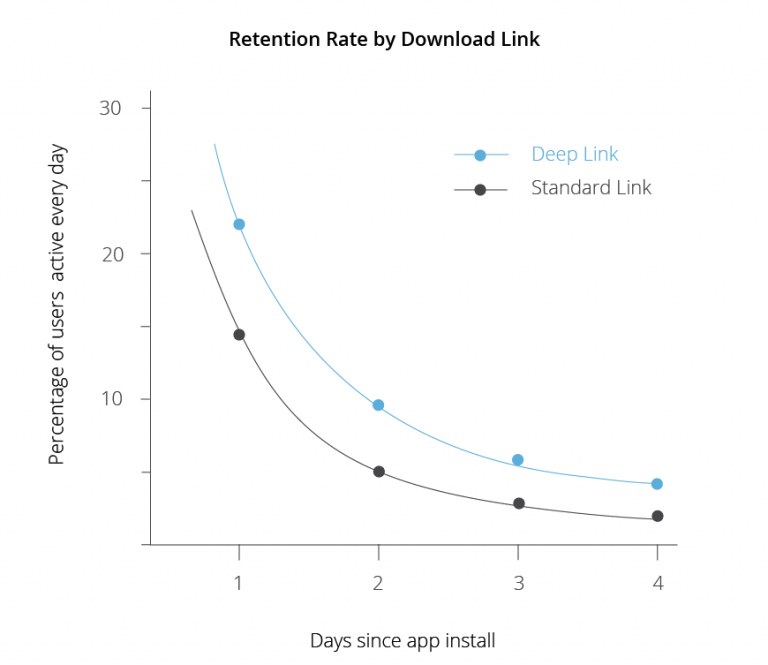
Re-Engage Inactive Users
You can re-engage Users who have been inactive for a long period of time. By sending them push notifications with deep links that direct them to new updates, exclusive deals or any relevant content that incentivize engagement.
Campaigns & Channels Analytics
As contextual deep links record and store data, you can track each campaign or channel and measure its performance. You can identify:
- Channels that drive high app installs.
- Campaigns that drive the highest revenue or highest churn.
- Frictions & bottle necks that user face from click to purchase
How can you implement deep linking into your marketing strategy?
App-to-app Marketing
Suppose you are on IMDB app checking movies reviews. Wouldn’t it be amazing to have a button on IMDB that will automatically direct you to the movie Netflix app?
Partnering with another app that has the same target audience and using deep linking would be a massive driver for user acquisition & engagement.
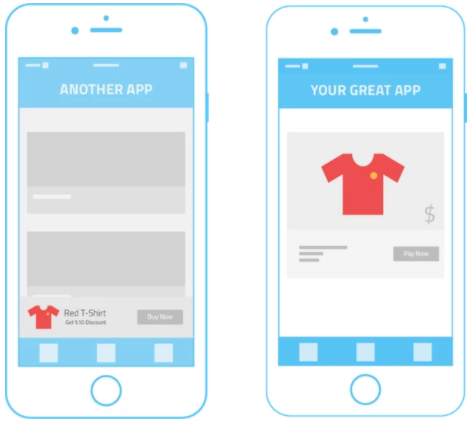
SMS Marketing
You can send deep links in SMS campaigns that would improve conversion rate. Fujairah Charity, one of appgain customers, started SMS campaigns for their donor base. Using Appgain’s smart deep linking, their conversion rate increased from 3% to 12% and reduced mobile marketing cost by 72%.
Social Media Marketing
You can use deep linking on any social media post or Ad to convert your followers into users by directing them into the discount page. You can also measure and compare the effectiveness of each social channel, campaign and influencer.
Display Advertising
Similar to Social Marketing, you can use deep links to direct the ad viewer to the offers or any relevant page.
Referral Marketing
If you have a referral/affiliate program, you can give each user or affiliate a unique deep link, so you can track how many users signed up and revenues generated through each user/affiliate.
Web to app
People nowadays prefer to be online on their phones more than their desktop. People also prefer surfing websites on desktop and using native apps on their phones. We explained in article before in detail how can you use web-to-app as a low cost strategy to drive user acquisition and how one of our customers increased their revenues by 28% using this strategy
Email Marketing Campaigns
Most consumers are checking their emails on their phone. It would be a lot more convenient and a better user experience if they clicked on the link and opened the app directly instead of going to the website. That’s why email-to-app conversion rate reaches to 50%, when using deep links.
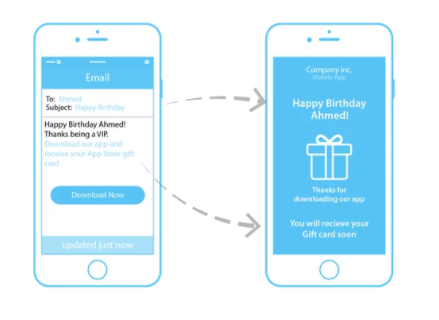
At last, you can use deep linking in your digital invoices to keep in touch with your customers all the time! If you want to learn more about digital invoices, visit our digital invoices page.
Deep linking is a powerful feature that enables your user to move smoothly and seamlessly from your advertising channels to your app. Additionally, it’s a driver for user acquisition & user engagement. Finally, It’s a strong analytics tool that helps you measure how each campaign is performing.
Now, if you want to try and test deep linking yourself and see how it will help you. We offer you a 14-day free-trial, all-inclusive access to our platform to help you take the first steps along the way. Got any questions? Do not hesitate to reach out and Request a Demo.
